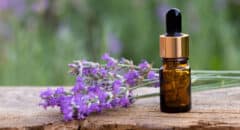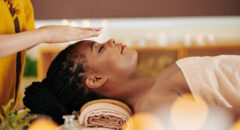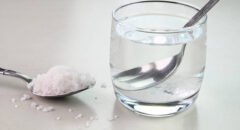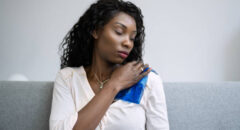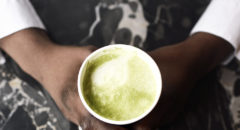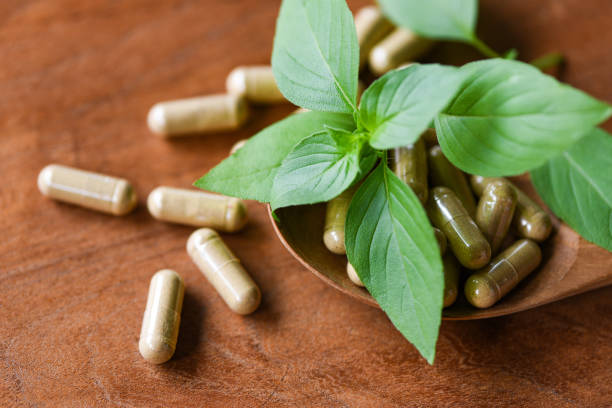
Sea moss, also known as Irish moss or Chondrus crispus, has a long, transnational story—one that stretches from the stormy coasts of Ireland to the sun-soaked Caribbean islands and the Atlantic shores of West Africa. It was used in Ireland during the potato famine of the 1840s, often as a last resort food, boiled into soups or added to broths to provide trace nutrients during times of scarcity.
In Caribbean cultures, sea moss evolved into something more. Known widely in Jamaica and Trinidad as a tonic for sexual health, stamina, and overall energy, it was mixed with condensed milk, linseed, flaxseed, and sometimes even Guinness beer or rum. This wasn’t just health food—it was a cultural ritual.
For many in the African diaspora, especially in Black wellness circles today, sea moss represents a return to ancestral knowledge—a powerful act of reclaiming traditional ways of healing in a world where Western medicine hasn’t always been equitable or inclusive. In the U.S., the growing demand is tied to the holistic health movement among Black millennials and Gen Z, who are turning to African and Caribbean herbal practices for wellness and empowerment
What the Science Says Sea Moss Can Actually Do
Sea moss has many benefits. It is rich in 92 of the 102 essential minerals the human body needs. This includes:
- Iodine – vital for thyroid hormone production
- Magnesium – supports muscle and nerve function
- Zinc – boosts the immune system
- Calcium & Phosphorus – for bones and teeth
- Potassium – regulates blood pressure
- Vitamins A, C, E, and K – support skin, immune health, and more
Here’s what researchers and medical sources say it might help with:
Thyroid Function: Iodine is critical for healthy thyroid performance. Sea moss is a natural source, but too much iodine can be just as dangerous as too little.
Digestive Support: Sea moss is mucilaginous (gel-like), meaning it coats the gut lining and helps support gut health and regularity.
Immunity: Contains antioxidants and bioactive compounds that may reduce inflammation.
Skin Health: Vitamins and minerals in sea moss are often used in skincare for their moisturizing and healing properties.
But here’s the key: these benefits are modest and depend on the quality of the sea moss, your diet, and lifestyle.
RELATED: Sea Moss Benefits: Skin’s Best Kept Secret
What It Doesn’t Cure, Despite Instagram Claims
Let’s get real. Social media is full of influencers selling the idea that sea moss can “cure everything.” And while it’s easy to see why people are looking for natural solutions, especially in communities where access to healthcare is limited or inequitable, it’s important not to overstate what sea moss can do.
Debunked or Unproven Claims:
- “Sea moss cures cancer.”
There is no clinical evidence that sea moss cures or prevents cancer. While it contains antioxidants, this doesn’t mean it stops cancer from developing. - “It treats COVID-19.”
There were waves of online posts claiming that sea moss prevented COVID-19. This is false. No plant or supplement alone can protect you from a virus. Trust the data and vaccines, not viral TikToks. - “Weight loss miracle”
Some say sea moss helps you drop weight fast. Truth? It may help reduce appetite because of its fiber, but real weight loss comes from long-term diet and activity changes. - “Detoxes the body”
Here’s a science fact: your liver and kidneys already detox your body every day. Sea moss doesn’t remove “toxins” from your blood—this is a popular but misleading health myth.
Hidden Risks People Don’t Talk About
Even natural things can be harmful if misused.
- Too Much Iodine – Sea moss has high iodine levels. Overconsumption can lead to thyroid disorders, including hyperthyroidism (WebMD).
- Heavy Metals – Sea moss absorbs metals from the water it grows in, including arsenic, mercury, and lead. Buy from reputable sellers and look for lab-tested products.
- Digestive Upset – For some, large doses can cause bloating, nausea, or diarrhea.
RELATED: Sea Moss Benefits: The Ancient Mucus-Fighter that Still Works Today
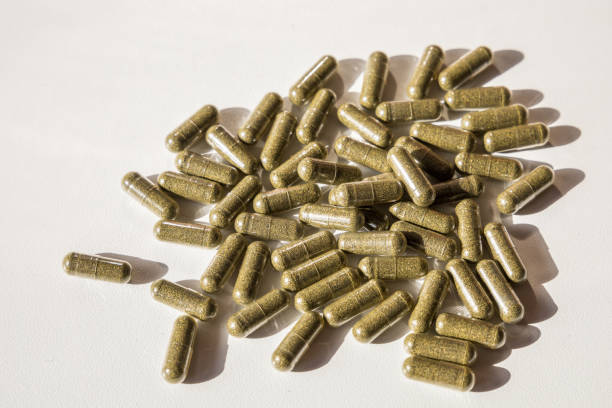
How to Use Natural Remedies With Medical Care, Not Instead of It
Sea moss can be part of a balanced, holistic lifestyle—but it shouldn’t replace medical care.
This is especially important in Black and brown communities, where distrust in healthcare is rooted in real histories—Tuskegee, forced sterilizations, racial bias in pain treatment. It’s understandable why many people turn to traditional remedies. But we can combine ancestral knowledge with modern science for the best care possible.
Talk to Your Doctor
- Bring sea moss up at your next check-up. Don’t be shy. Many doctors are more open to discussing herbs and supplements today.
- If you’re pregnant, nursing, or have thyroid issues, you must check in before using sea moss.
Stick to Safe Dosages
- Recommended: 1–2 tablespoons of sea moss gel per day
- Too much can harm your thyroid or kidneys.
Choose Quality
- Avoid “pool-grown” sea moss—it’s mass-produced and nutritionally inferior.
- Look for wildcrafted or organic sea moss from clean, deep ocean sources.
- Support Black-owned wellness brands that lab-test their products. Try Vital Vegan Inc. or Plant Based Jeff—they source ethically and serve the community.
Combine Remedies With Wellness Routines
- Sea moss + water + fiber-rich diet = gut health
- Sea moss + strength training = better recovery
- Sea moss + regular checkups = empowered, long life
Why Balance Matters in Our Healing Journey
Healing isn’t just about what you eat. It’s about how you live.
In many African and diasporic traditions, healing is communal, spiritual, and ancestral. Sea moss connects us to those roots, but balance is still essential.
True healing looks like:
- Eating greens and drinking water
- Sea moss and regular exercise
- Prayer and blood pressure checks
- Elder knowledge and science-backed research
Sea moss is a gift from the ocean. It’s nutrient-rich, steeped in tradition, and has earned its spot in the natural wellness world. But it’s not magic—and it’s not medicine on its own.
To our people: don’t be swayed by Instagram hype without facts. Trust our roots, but also trust in balanced, informed choices. When we blend the ancestral with the scientific, we take control of our health—and that is revolutionary.



